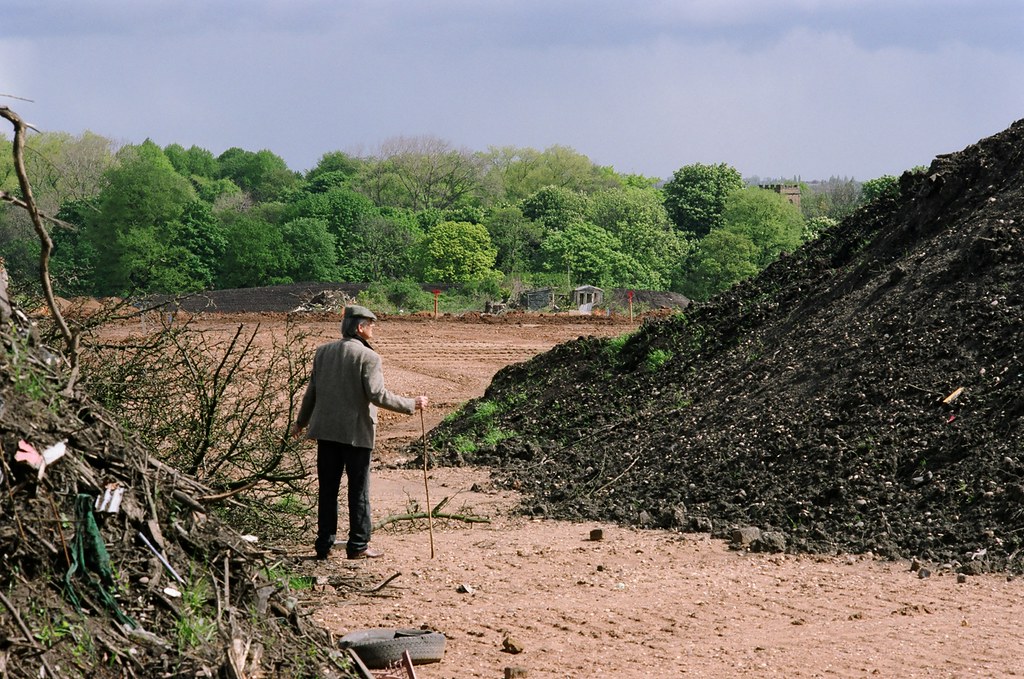*** ***
I continued digging, working faster than before after Jill's advice; not worrying about picking out stones and weeds, just turning the soil with the fork. Later I can go over the ground and pick out roots and larger stones and other detritus that got mixed with the soil when the developer levelled the ground of the original allotments and pushed all the topsoil into an enormous mound near the backs of the houses on Holly Road, only re-spreading the resulting mélange in the early months of this year. Bits and pieces of plastic, glass, polythene, rusty iron, a chunk of lead, pieces of wood, ground up parts of sheds, greenhouses, fences and other things that were once on the old private plots of the Victoria Jubilee Allotments.
Topsoil from the VJA site in 2005. Photo: Luke Unsworth
There are whole bricks, old and new, chunks of gravel and tarmac, and innumerable smooth rounded stones and pebbles that were once under the surface of the twenty mile wide tropical prehistoric river estuary that someone on Uplands Allotments, up the road, told me flowed through this area millions of year ago.
 |
| fat-hen. It's food! |
****
There's been rumours and rumours of allotment rent increases for at least a year. I've just seen a note on the Birmingham & District Allotments Council website dated 9 July 2010:
Had a sneak preview of the new rent increases - not good news at all! Will post them on the website as soon as possible. All I can say that by 2013 there may be a lot of plots surrendered!
I ought to relax with shock horror but - pause - there's a longer argument. Allotments were once for the poor - a plot of land on which a working man could raise food for his family. Increasingly reasons for working an allotment have become more layered - in the words of an Oxford Brookes study, which produced a pie-diagram of plotholders' reasons for leasing:
 If I understand this, the 'cheap food' motive is one among many others, with 'health', 'quality food', 'environmental concerns' being of equal or higher importance. Allotments in many places have become gentrified. More are becoming so - worked by people who could afford to pay more, especially as 'cheap food' isn't a priority. Add-in an unprecedented cash squeeze on the public sector and there are more reasons why local government managers and councillors to plan rent increases for municipal allotments, increases that will have been preceded on private allotments (note the £150 annual rental option proposed by The New Allotment Company).
If I understand this, the 'cheap food' motive is one among many others, with 'health', 'quality food', 'environmental concerns' being of equal or higher importance. Allotments in many places have become gentrified. More are becoming so - worked by people who could afford to pay more, especially as 'cheap food' isn't a priority. Add-in an unprecedented cash squeeze on the public sector and there are more reasons why local government managers and councillors to plan rent increases for municipal allotments, increases that will have been preceded on private allotments (note the £150 annual rental option proposed by The New Allotment Company). I was given a reminder of harder facts by Richard Wiltshire at least four years ago. He gently but firmly interrupted my flowing derogation of developers, victimisation of gardeners, the bias of community planning gain agreements, loss of urban growing space..."If people are so keen to grow their own food why don't they use and share domestic gardens that exist in abundance among the non-tower block residing middle classes."
Richard had just co-authored Growing in the Community - an LGA policy report which has government favour both before and, I suspect, even more so after the latest election. It emphasises the move away from a 19th century tradition of allotments as an antidote to pauperisation. Richard had stopped me to impart reservations about the allotments as opposed to city farms. "Why are city farms thriving and allotments under threat?" The word 'allotment' contains an implication of calculative philanthropy - "We'll allot you some land to grow food...until we need it to make money." Much allotment land is on prime urban development land with potential rental value vastly in excess of current allotment rents. He argues that the degree of protection accorded allotments would be more politically acceptable if a greater number of plot-holders were more ready to exercise the social responsibilities, locally and nationally, that should go with being so sheltered from market forces. Instead many view their plots as held by right, shouting too loudly against any move to increase rents - and in the process undermining their political position, especially the standing of their national body - NSALG. The way this argument goes is that - like parks with which I'm well familiar and have written - the existing case for allotments as a public good has become largely redundant. If allotments are to survive and thrive a new and more sophisticated case, like that now refined for public parks [see the Philadelphia Report] must be made to justify not replacing them with buildings. I'd go along with that. It's a case that we'll need to have in hand when Birmingham City Council presents us with its plot rent rise proposals. Present charges:
Plot Category | Full | Over 60 Rate |
Small ( Cat A ) | £22.00 | £11.00 |
Standard ( Cats B/C ) | £28.00 | £14.00 |
Large ( Cats D/E ) | £39.00 | £19.50 |
Mini Plot (Cat A*) | £12.00 | £6.00 |




No comments:
Post a Comment